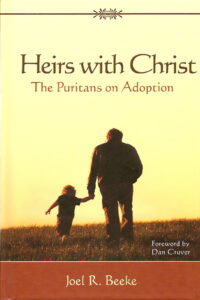
The Puritans were fond of stressing the transforming power, superlative value, and surprising wonder of adoption. They spoke often of its greatness, excellency, and comprehensiveness.
William Perkins said that a believer should esteem his adoption as God’s child as greater than being “the childe or heire of any earthly Prince [since] the sonne of the greatest Potentate may be the childe of wrath: but the child of God by grace, hath Christ Iesus to bee his eldest brother, with whom he is fellow heire in heaven; hee hath the holy Ghost also for his comforter, and the kingdome of heauen for his euerlasting inheritance.” Perkins lamented how few people realize this experientially: “At earthly preferments men will stand amazed; but seldome shall you finde a man that is rauished with ioy in this, that hee is the childe of God.”1Workes of Perkins, 3:138 (2nd pagination).
Hugh Binning wrote that to claim to be a son or daughter of God “is a higher word than if a man could deduce his genealogy from an uninterrupted line of a thousand kings and princes. There is more honour, true honour, in it, and more profit too,” he concludes, for spiritual adoption “enriches the poorest, and ennobles the basest, inconceivably beyond all the imaginary degrees of men.”2Works of Binning, 253–54. Jeremiah Burroughs stated it even more strongly by quoting Luther’s comment that “if we did but know what this privilege [of adoption] were [sic], all the riches of all the kingdoms in the world would be but as filthy dung to us.”3Burroughs, The Saints’ Happiness, 194.
“All things are ours by virtue of our adoption,” Richard Sibbes wrote, “because we are Christ’s and Christ is God’s. There is a world of riches in this, to be the sons of God. And what a prerogative is this…that we have boldness to appear before God, to call him Father, to open our necessities, to fetch all things needful, to have the ear of the King of heaven and earth, to be favourites in the court of heaven!”4Works of Sibbes, 4:502.
The greatness of adoption is magnified, as Thomas Manton pointed out, when one considers the contrast between “the person adopting: the great and glorious God” and “the persons who were adopted: miserable sinners” in the light of “the dignity” of the adoption itself. That dignity is so great, Manton goes on to say, that when it is set beside any other earthly privilege and rightly viewed, we must “blush and hide our faces” because “all the splendid titles which are so ambitiously affected by the world, are but empty shows and gilded vanities, and do much come short of this privilege, both in honour and profit.” Moreover, all other titles will perish when we die, but the title of being a son of God will not “cease at the grave’s mouth.”5Works of Manton, 12:122.
Spiritual adoption is the excellency and apex of God’s salvation. The Puritans often shared the apostle John’s sense of awe when he declared,“Behold, what manner of love the Father hath bestowed upon us, that we should be called the sons of God” (1 John 3:1). What a stupendous wonder adoption is! Wilhelmus à Brakel put it this way: “From being a child of the devil to becoming a child of God, from being a child of wrath to becoming the object of God’s favor, from being a child of condemnation to becoming an heir of all the promises and a possessor of all blessings, and to be exalted from the greatest misery to the highest felicity—this is something which exceeds all comprehension and all adoration.”6Brakel, Christian’s Reasonable Service, 2:419.
And how comprehensive adoption is! Most Puritans place their treatment of adoption in the ordo salutis between justification and sanctification, following the order set forth by the Westminster Divines. Logically, that structure makes considerable sense, given the inevitable ties between justification and adoption, and sanctification and adoption, as we will see shortly. Other Puritans, however, have pointed out that though adoption can at times be viewed as one aspect of salvation, or one part of the ordo salutis, at other times it can be understood best as comprehending all of soteriology. For example, Stephen Marshall writes, “Though sometimes in the holy Scriptures our Sonship is but one of our Priviledges, yet very frequently in the Scripture all the Beleevers do obtain from Christ in this world and the world to come, here and to eternity, all is comprehended in this one, That they are made the Children of God.” Marshall goes on to cite several examples: “I know not how often the whol Covenant of Grace is expressed in that word, I wil be their Father, they shal be my children,” or consider Ephesians 1:5, he says, where Paul comprehends all of salvation “in this one expression, having predestinated us to the adoption of children.”7Marshall also uses Romans 8:23 and the beginning of Galatians 4 to buttress Scripture’s frequent comprehensive use of adoption (Works of Stephen Marshall, 37–38).
Clearly, the Puritans ascribed a lofty and comprehensive place to adoption in their soteriology. Recent studies have reaffirmed and even surpassed the Puritans in giving adoption a place of prominence. In his recent, excellent dissertation, “Adoption in Christ,” David Garner argues that adoption in Scripture is coterminous and nearly synonymous with union with Christ; hence, it should never be placed in the schema of the ordo salutis as an individual aspect, but ought to be always regarded as an overarching doctrine that embraces the whole of soteriology.8Garner, “Adoption in Christ,” 229–53. In essence, that is Marshall’s position as well, though Marshall allows for interpreting certain texts on adoption, such as Romans 8:14–17, as accenting one aspect of the ordo salutis. It seems to me that Marshall is more accurate here. The question of whether adoption is one aspect of the ordo salutis or comprehensive of its whole is not an “either–or” but a “both–and” proposition, dependent on the particular text being examined.
Robert Peterson throws the net out even wider. He sees adoption as “an overarching way of viewing the Christian faith,” arguing that adoption influences most major theological loci.9Peterson, “Toward a Systematic Theology of Adoption,” Presbyterion, 27, no. 2 (Fall 2001): 121. That concept is most intriguing, and it is worthy of further study and development.
Excerpt from
Heirs with Christ: The Puritans on Adoption
By Joel R. Beeke









